- Home
- Brian Hodge
Hellboy: On Earth as It Is in Hell Page 2
Hellboy: On Earth as It Is in Hell Read online
Page 2
And as he spoke, so he lived. The evidence was inside his left sleeve. He'd lost the arm in France, or so he said, and whether true or not, what mattered was that Ernst had seen a photograph of him shirtless, his shoulder reduced to a raw knob of jutting bone beneath stretched and sutured flesh.
No longer, though. It was growing back, a slow but steady restoration of bone and skin and muscle that Herzog attributed to an act of will, no more and no less. He'd seen it, Ernst had, just once...small and pink and hairless, a child's limb still, but the fingers could flex. He could raise the arm, could make a fist.
"Don't look so nervous," Herzog told him. "You survived a losing war. The next one is yours to win."
And as they approached the far end of the cellar, the air began to warm with every step, and Ernst could see the gleaming head that rose above the heads of everyone who still stood between them and the far wall. Wordlessly they stepped aside, some bowing their heads in deference, until finally this human curtain had parted and he could see what waited.
It was bronze, he thought, rubbed to a shiny dark yellow at the top, where perched upon a set of massive shoulders, the crowned and fearsome head of a bull stared out over them all, huge mouth open wide in an eternal roar. It sat upon a throne, regal and arrogant, yet held both arms stiffly before its thick chest, human hands empty and upturned. Strangely, its color changed from the top down, the polished head and chest fading to a deeper tone that in turn became a glowing red. Its legs and the seat and enclosed base of the throne shimmered with heat, while smoke fumed from vents cut into the sides.
As Herzog stepped away from him, someone thrust a small frame drum into one of Ernst's hands, a beater into the other.
Whatever Herzog had to say next was mercifully brief, and in no language Ernst could understand. Then the man turned his back on them all as the place erupted into a cacophony of rhythmless drumming, tuneless piping. It came from everywhere at once, and was nothing any sane person would call music--volume was all that seemed to matter. One-handed, Herzog slung Erich onto the outstretched bronze hands, a natural cradle from which the baby could not roll free. Even if Ernst could no longer hear the infant he'd carried so far on aching feet, he could see the tiny arms flailing in fear, and then the baby began to rise, an impossible sight, both bronze arms lifting upward in jerky movements, as though ratcheting one gear tooth at a time, until the hands were at the gaping mouth...
And the hands were empty once more.
While the band played on, Ernst was ashamed to find himself playing along too, helplessly battering at the drum they'd given him, not daring to falter, because what if his contribution to this din was all that kept him from hearing the screams that had to be coming from inside the statue.
Even so, it still wasn't loud enough to mask the sound of a low, subterranean groan of satisfaction.
Chapter 1
Forty-nine hours after the inferno, he could still smell what made it unique.
Fires and their aftermath had their own signature smells. Anyone who fought them for a living could tell you as much. A forest fire? It smelled natural...just wood and sap, and lots of it, like a big campfire. An urban blaze was totally different--toxic with all the synthetics they put into the buildings, the furniture, the clothes on their own charred backs.
The thing was, he knew smells that few firefighters had ever encountered, and even if they had, most couldn't have recognized them for what they truly were.
Hellfire? He knew the smell, all right. Brimstone and bitumen and something like the roasting of marrow-rotted bones that might blacken but never fully burn. Sometimes he felt the smell was never far from his nostrils, something he just knew, a birthright he carried in his blood.
This smell, though? Here, in this wreckage and ruin? It was a first for him.
Although that didn't mean he had no idea what it was.
Divine fire, holy fire, fire from Heaven, to clear and cleanse...it left a lingering scent in the ash, mixed in with the stink of immolation and meltdown, a subtle but jarringly incongruous fragrance, like blossoms in a midsummer field, only more astringent. Sniff it in too great a concentration, and he imagined that it would sear the nostrils. He suspected that it bore some relation to the phenomenon known as the Odor of Sanctity, the sweet fragrances that were sometimes reported accompanying the appearances of saints and manifestations of the divine.
That such a smell could linger in a place of so much devastation seemed more than a little like mockery.
He'd never smelled it before but was surprised to find that he knew it so readily, as surely as he knew its opposite. Another birthright, maybe, innate knowledge of an enemy he'd been conceived to fight but never had, never would, because he'd chosen differently. Hell's enemies were not his own. Hell's enemies were his allies--the enemy of my enemy is my friend.
Or so he'd always believed.
Divine fire, holy fire, fire from Heaven, to clear and cleanse...
The last place he'd expected to come across it was the Vatican.
BUREAU FOR PARANORMAL RESEARCH AND DEFENSE
Field Report EU-000394-59
Date: October 16, 1996
Compiled by: Dr. Kate Corrigan
Classification: Open Access
Interview Subject: Father Rogier Artaud (assistant curator, Vatican Secret Archives; specialist in Palestinian antiquities)
The incident under investigation occurred at approximately 10:30 pm on Monday, October 14, as Fr. Artaud was working in the private research area on the fourth floor of the Archives.
[Before I continue, I should clarify a possible misperception for the benefit of anyone in the BPRD who may refer to this file in the future. It was, I admit, news to me: The Vatican Secret Archives aren't nearly as covert as the name implies. They were founded in 1612 by Pope Paul V as a repository for papal records, correspondence, official files, etc.... comprising, at present, a whopping 25 miles of shelf space. The "secret" designation lies in the archaic definition of the word: private, rather than deliberately withheld. They're open to any scholars who obtain permission for admittance. As of this writing, all papal archives up to the late 1920s are available for study. An approximate seven-decade restriction prevents access to the modern era...roughly comparable to the lifetime of a living pope, or, in the case of the longer-lived pontiffs, his adult life and career. That said, there are also numerous historical documents in the Archives that have secular origins, or otherwise fall outside of official Church business. Fr. Artaud cites a love letter penned by King Henry VIII to Anne Boleyn in which he pledges his heart to her...ironic, considering the eventual fate of her head.]
At approximately 10:10 pm, Fr. Artaud removed Document s/00183/1966 from its drawer in a temperature- and humidity-controlled vault used for storing and protecting particularly fragile artifacts. [Re: Document s/00183/1966, see Field Report Supplement EU-000394-59supA.] Permission for its removal had been requested by Fr. Artaud nine days earlier, and granted the afternoon of October 11. The circumstances leading up to its necessity are still not fully understood, but at this point, what we know is this:
In the earliest days of October, Fr. Artaud wished to compare high-resolution scans of Document s/00183/1966 (which exist to facilitate document analysis without need of handling the original) with various points raised in an article about to be published in a journal of the Ecole Biblique, a Jerusalem archaeological school operated by French Dominicans, which has exercised considerable influence over the Dead Sea Scrolls since their 1947 discovery. The article in Fr. Artaud's possession concerned paleography: the study of handwriting in ancient manuscripts--in this particular case, manuscripts from first-century Palestine. However, for reasons as yet unknown, the two physical copies of the document's scans had evidently been misplaced and the computerized version corrupted and thus inaccessible. In retrospect, this is extremely suspicious, but initially it appeared to be a mere unfortunate coincidence of sloppiness and bad luck.
Note: That so few
copies of these scans existed is a reflection of the highly sensitive nature of Document s/00183/1966, rather than the inadequacies of the Archives' data backup policy. Although, if I may be indulged another personal observation, while I wouldn't be so presumptuous as to pass judgment on the integrity of their physical recordkeeping, which I'm sure is ordinarily above reproach...they trusted a single electronic copy to Windows 95???
At a minute or two before 10:30 pm, as Fr. Artaud was rescanning the document in preparation for his study, he became aware of two anomalies: flickering and dimming in the electricity, and an abrupt drop in the air temperature in his work area. This was no minor chill passing through, and well beyond the capabilities of a malfunction in the A/C system, which was not in operation at the time anyway. Fr. Artaud estimates the temperature drop to have been at least 50deg F in a minute's time. As it was cold enough for him to see his own breath, this was far below the outside temperature as well. According to local meteorology reports, routine measurements near the Vatican at 10:30 pm on the night of October 12 put the temperature at 64deg F/17deg C. Fr. Artaud also noticed that the cold was unmistakably descending from above.
I'm tempted to say this is the weird part, but then, it's all weird. According to Fr. Artaud's testimony, over the weekend, while he was riding his bicycle in a large market area near the Vatican called the Borgo, he was stopped by a young man who warned him, with the kind of deadly seriousness that only a street lunatic can muster, to "run when the ceiling turns to ice." Naturally Artaud dismissed the encounter and went on his way.
And, just as naturally, it came back to him during this abnormal temperature drop. But at this point, his concern was primarily for the integrity of Document s/00183/1966. Like all fragile documents, it's best protected from shifts in temperature and humidity. Because the low temperatures appeared to be originating overhead and the power supply appeared unstable, and because Artaud was now a bit unnerved by the warning, he placed the five separate sheets of Document s/00183/1966 in their storage drawer and sought lower ground. He didn't linger to talk with any of the handful of other Archivists working at this late hour, among whom the drop in temperature was the obvious topic of conversation.
This undoubtedly saved both Fr. Artaud's life and the document. As he reached a staff-only stairwell, he heard the shattering of glass and looked back long enough to witness two figures entering through a tall outside window. He also reports hearing the breaking of at least one other window, out of view, leading to the conclusion that the intruders numbered at least four to six.
What he saw he describes as humanoid, if not strictly human. At first he thought they were some sort of commando team. But then, "They changed from shadow to light in only a moment or two. I don't mean they moved from one to the next, like stepping out of a dark room. I mean this is what they were made of. In one moment, like a cloak of dark rags. In the next, so white they seemed to glow, like the filament of a light bulb."
Fr. Artaud didn't pause for more than a brief glance. It was at this point that the arrivals began spewing fire. Exactly how they went about this is unknown, as there are no other witnesses, but the attached photos of the damage inflicted upon that section of the Archives is testament to their efficiency.
One observation: The process by which these entities created fire from their own bodies is, by all available evidence, different from that shown by the BPRD's resident pyrokinetic, Liz Sherman. Although Ms. Sherman's abilities are still not fully understood, she appears to be the fire's conduit, rather than its creator.
On the other hand, the beings at the Vatican Archives appear, to some extent, to be subject to the laws of physics and thermodynamics. They evidently did not generate their flames out of nothing, but instead, immediately prior to their attack, drew the required energy from the air temperature in the vicinity and from the power grid.
Because I'm preaching to the converted here, I shouldn't have to remind you of the oft-reported phenomenon that certain spiritual manifestations are sometimes accompanied by temperature drops and electrical disturbances. The most widely accepted rationale for this occurrence is that the spirit entity requires energy to make itself visible, and uses the process of convection to obtain that energy from the nearest sources: warm air, electricity, etc.
A similar phenomenon appears to have happened at the Vatican Archives, only the siphoned energy was weaponized. The expended energy had to have been far greater than what was drawn from the local environment, leading one of our physics consultants to speculate--at the risk of making an obvious paranormal event sound overly mechanical--that the attackers also functioned as their own transformers.
Completion pending conclusion of on-site investigation...
Chapter 2
Hellboy got as much of the background from Kate Corrigan as seemed relevant--he would skim the reports later, maybe--then decided to push on and inspect the wreckage for himself.
Stone columns and archways, fluted ceiling joists, old oak cabinets and tables...most of it had probably looked much the same for centuries, and the only way he could tell it had once been beautiful was by context, the hallways and the rooms he and Abe had passed through to get here. There was nothing beautiful about it now; it was like the inside of a kiln that had been used too many times without cleaning. They'd be scraping this place out for weeks. Even the lighting was harsh now, most of the normal fixtures destroyed and, for the time being, replaced with cable-fed portables with the same harsh glare as a mechanic's garage.
"How hot would you say it got in here?" he asked.
"You can cremate a body in half an hour at 1300 degrees or so," Abe said. "So in excess of that. Because these look more like flash fires. They don't seem to have burned for long. They cooked everything in their path, but..." With a gray-green hand mostly concealed within the sleeve of his topcoat, he pointed to the ceiling, the floor. "They didn't spread beyond this section of the Archives. Those kinds of temperatures, for any duration...this could've been worse."
As they walked along a row of oak cabinets charred down to kindling, Hellboy felt, heard things grind underfoot. They could be walking on bones, or what remained of them, and never know.
"Spontaneous human combustion," he said. "That's what it reminds me of. I've seen it twice. Not while it was happening, but after. There's some freaky selectivity in that kind of fire. One guy burned so hot it melted candles in their stands across the room, but the easy chair he was sitting in...give it a good cleaning and you might've been able to use it again."
"What it reminds me of is gang warfare," Abe said. "An assassination, except they were using fire instead of bullets. And weren't a bit concerned who got caught up in it."
Hellboy nodded. Some of that, yeah, he thought...but part spree killing, too. Like the guy who walks into the place where he used to work and starts unloading, and it no longer matters who he does and doesn't have grudges against. If it catches his eye, it's a target.
You could follow the paths of some of the flames, trenches dug and melted into the patterned tiles of the floor, as though concentrated bursts had generated on the spot, then coursed after their targets. Most of the paths were straight, like third-degree burns that slashed across rooms, down hallways, along ceilings. But a couple of them had altered course...one curving in a broad arc, the other hooking a sharp left after twenty or so feet and reducing a display case to a pile of slag.
No concern for who got caught in the crossfire, Abe had said. Hellboy didn't doubt he was bothered greatly by the human loss--seven casualties was the estimate so far, and the number would've been a lot higher had this attack occurred during the day instead of late at night--but Abe would be mourning more than life. This place had been called a decanting of history, and Abe Sapien would be mourning that, too. He wasn't strictly human, Abe wasn't--or not entirely--but he read more than just about any five other living souls that Hellboy knew. If Abe had been in some other kind of skin, this might have been the sort of place he would've ended up, an
d happily so, tending to the past so that it would continue to live and speak.
They were just things, that's all, someone might have said. Just books, just papers, just manuscripts and ornaments and trinkets. Nothing when compared to the value of a human life. They'd never drawn breath, all these inanimate things. They didn't scream as they burned. But things often survived the people who owned them, then outlived everyone who'd remembered their owners, until the day came when things were all that were left to speak for lives long gone.
The two of them were stepping around the crusted remnants of a large, square, frescoed column when Hellboy felt Abe's touch on his arm. He followed Abe's other hand, pointing off to their left, a spot on the nearest wall they might have overlooked because it blended so well with the rest of the destruction.
Optical illusion--when you first looked at it, you didn't see it for what it really was. No, that took a few moments. At first, all you saw was a wide circular area more than halfway up the fifteen-foot wall that had been turned into a blackened cinder. Stone, plaster, wood--whatever was there had been blowtorched into some crumbling alloy that faded into the pigments of the mural painted there centuries ago.
Look deeper, though, and then you would see it: the desiccated suggestion of a man blown off his feet and hurled high against the wall--fused into the wall, a charcoal man outstretched in his final agonies and joined to the architecture in bas-relief. Stand in the right place and you could picture how it probably happened: The guy's running when he catches his assailant's attention; no chance of dodging the fireball, but it's partially deflected and absorbed by the square pillar standing between them...the only reason there's as much left of the guy as there is, why he wasn't rendered even further down to ash.

 The Weight of the Dead
The Weight of the Dead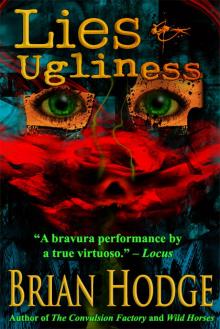 Lies & Ugliness
Lies & Ugliness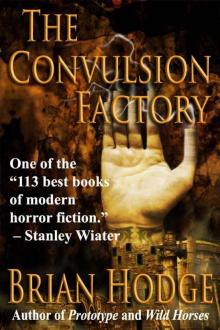 The Convulsion Factory
The Convulsion Factory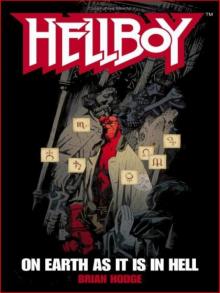 Hellboy: On Earth as It Is in Hell
Hellboy: On Earth as It Is in Hell Whom the Gods Would Destroy
Whom the Gods Would Destroy Picking the Bones
Picking the Bones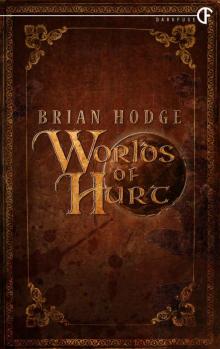 Worlds of Hurt
Worlds of Hurt Oasis
Oasis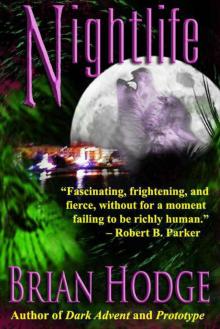 Nightlife
Nightlife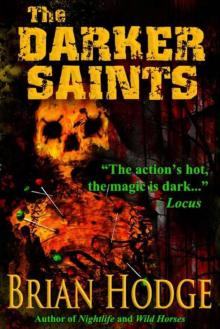 The Darker Saints
The Darker Saints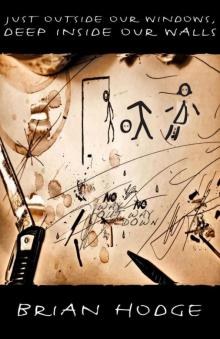 Just Outside Our Windows, Deep Inside Our Walls
Just Outside Our Windows, Deep Inside Our Walls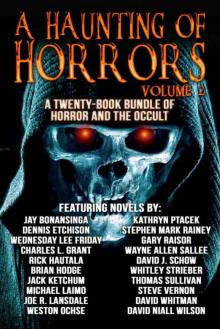 A Haunting of Horrors, Volume 2: A Twenty-Book eBook Bundle of Horror and the Occult
A Haunting of Horrors, Volume 2: A Twenty-Book eBook Bundle of Horror and the Occult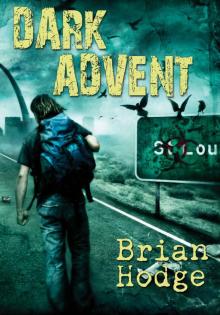 Dark Advent
Dark Advent Mad Dogs
Mad Dogs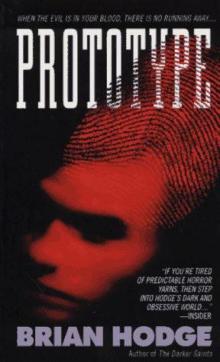 Prototype
Prototype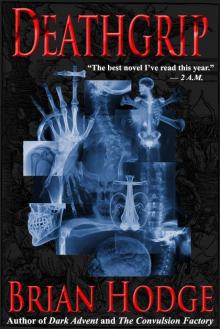 Deathgrip
Deathgrip Falling Idols
Falling Idols